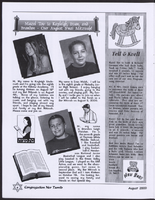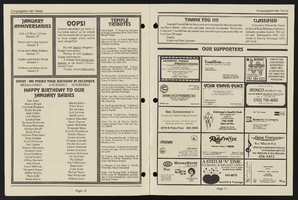Search the Special Collections and Archives Portal
Search Results

Transcript of interview with Dr. Ed Goldman by Barbara Tabach, March 22, 2016 and April 4, 2016
Date
Archival Collection
Description
In this interview, Goldman discusses the impact of strategies for addressing segregation in schools, including desegregation lawsuits, as well as anti-Semitism within the district. He also talks about his push, as region superintendent, for K through 8th grade configurations in schools as well as his opening of West Preparatory Institute, a K-12 school in Westside. Goldman discusses the politics of school naming and goes through the various community members who have schools named after them. In addition, he reflects upon how his job as a Clark County School District central office administrator has morphed over the years, and the different issues that demand his time over the years.
Edward ?Ed? Goldman was born in Rochester, New York in 1951, and spent his childhood in Jerusalem, Israel as well as Cincinnati, Ohio. He received his first bachelor?s degree in political science from Columbia University and a second in Jewish Studies from the University of Judaism. Goldman later received a master?s degree in political science from California State University, and then a doctorate in education and higher administration from UNLV, focusing on educational law. Goldman first moved to Las Vegas while on a leave of absence from his job in Los Angeles to finish his Ph.D. dissertation, working as a math teacher for the Clark County School District. However, it was not until 1981 that Goldman took a full-time position with the district, and moved with his wife, Susan, to the city. After the move, his first job was at Von Tobel Junior High School. Three years later he served as dean at Woodbury Junior High School. From 1989 until 2000, Goldman led recruitment for the school district, and subsequently, he became the Southeast Regent Superintendent. He then was asked to create a new division, Educational Services, which he oversaw for five years. He then took a break from central office administration, returning to the school environment, until he was asked to come back to his previous job as Associate Superintendent for Employee Management Relations.
Text
Rochelle Hornsby oral history interview
Identifier
Abstract
Oral history interview with Rochelle Hornsby conducted by Barbara Tabach on November 30, 2016 for the Southern Nevada Jewish Heritage Project. Hornsby arrived in Las Vegas, Nevada in 1962 when her former husband Len took a position with a local radio station. Her sales talent led her into promotional sales for conventions and she talks about her former husband's and her careers in Las Vegas. For over twenty years she has been a residential real estate agent. She also talks about volunteering with the Temple Beth Sholom Sisterhood, and the 25th Anniversary celebration of Israel.
Archival Collection
Audio clip from interview with Gary Sternberg, April 7, 2015
Date
Archival Collection
Description
Gary Sternberg recalls how he secured funding from Frank Sinatra for Congregation Ner Tamid's new building.
Sound
Wilner Family Collection
Identifier
Abstract
The Wilner Family Collection is comprised of audiovisual material on real estate in Las Vegas, Nevada collected by Las Vegas real estate agent, Linda C. Wilner. The collection includes informational videos for real estate agents and promotional showcase materials on various real estate developments around Las Vegas including Summerlin, Lake Las Vegas, Turnberry Place, Park Towers, Sun City Anthem, Sun City MacDonald Ranch, and Christopher Homes. This collection also contains a digital surrogate of a scrapbook commemorating Linda Wilner's uncle, Leo Wilner, and his retirement as executive director of Temple Beth Sholom in 1984.
Archival Collection

Transcript of interview with Wilma and Burt Bass by Barbara Tabach, February 9 , 2015
Date
Archival Collection
Description
In 1939, Wilma (Frank) Bass was born in New York City, where she began her involvement in theater at the age of ten. Almost twenty years later, she met Burt Bass (1932- ) when both worked for a photography studio, one of Burt first post-high school jobs. Burt opened his first professional photography studio in 1962, shortly after he married Wilma in 1960. The couple soon had two daughters – Jill and Wendy – and moved to Las Vegas in 1974. Burt initially worked for his brother-in-law Ed Frank's check cashing businesses and later opened his own photography business, Burton Studio. He later added services such as fingerprinting, background checks, and photographs for identification cards. Wilma worked as a jewelry salesperson, first at the Gold Factory then at Nieman Marcus. Socially, she was very involved with Temple Beth Sholom’s Sisterhood, using her theater talents to write, direct and produce various shows for the Sisterhood, ORT as well as B’nai B’rith Youth Organization. In this interview, Burt discusses his photography business, the migration of its storefront around town, and his colorful landlords, including individuals like Moe Dalitz and Art Marshall. Wilma talks about her sales career in the local jewelry industry, and more extensively, she shares memories of her involvement in the Jewish community with theater productions. Much of the discussion revolved around related news articles and personal photos from their relationships and activities within the Jewish community. The couple also shares stories of friendships with local entertainers, including Jerry Lewis and Neil Sedaka.
Text





